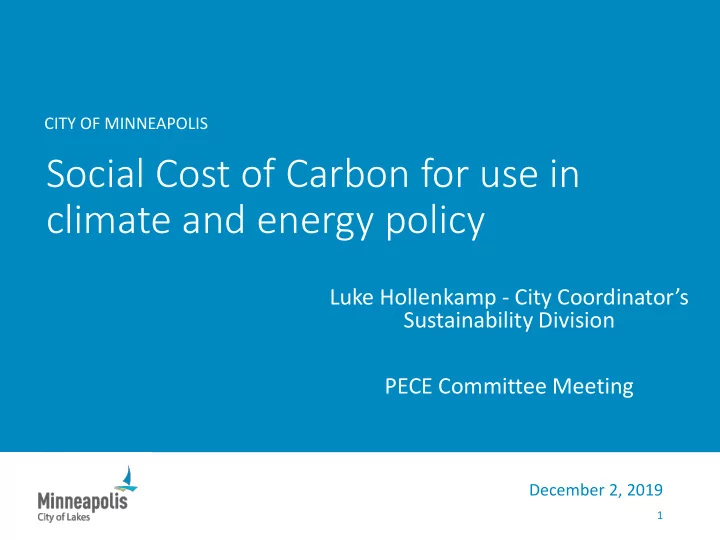

CITY OF MINNEAPOLIS Social Cost of Carbon for use in climate and energy policy Luke Hollenkamp - City Coordinator’s Sustainability Division PECE Committee Meeting December 2, 2019 1
Staff Direction Directing Sustainability, Finance, Health Department, and Attorney’s Office staff to bring forward to the Public Health, Environment, Civil Rights & Engagement Committee a recommendation or set of options for a social cost of carbon to be considered for adoption by the City Council PECE Committee Meeting (Aug 26, 2019) 2
Cost of Climate Change Impacts • Lack of progress to stop the climate emergency creates enormous societal costs • Societal costs are not currently being factored into the economic costs of greenhouse gas emitting activities • Economic Externalities must be addressed to Courtesy: Climate Impact Lab mitigate climate change 3
Social Cost of Carbon Measures Externalities • The Social Cost of Carbon (SCC) is a commonly employed metric calculated by the scientific community of the expected long-term damage done by a ton of carbon dioxide (CO 2 ) emissions in a given year • Also measures the societal benefit of a CO 2 reduction Courtesy: Axios 4
Using a Social Cost of Carbon Example: Shadow carbon pricing • For internal accounting and decision- making • Used by many organizations to gauge climate impact and manage risk City’s Fleet EV Study (2017) • Potential payback periods: premium capital cost was compared to the annual fuel, maintenance, and carbon savings • Carbon savings were monetized by using EPA’s SCC 5
Carbon Costs and Pricing Globally Wide Range of Recent Recommendations for 2030 Prices to Deliver on Paris Agreement W/ Supporting Policies • $50-$100/tCO 2 e (CPLC) • $75/tCO 2 (IMF) W/O Supporting Policies • $135-$6,050/tCO 2 e (IPCC) “State and Trends of Carbon Pricing 2019” State and Trends of 6 Carbon Pricing (June), World Bank, Washington, DC.
Federal Agencies (Obama Admin) • Prior to 2009: Multiple federal agencies developed and used their own SCC as part of their rulemaking processes. • 2009-2010: An interagency working group of scientific and economic experts was convened to harmonize this range of different SCC values and ensure that agencies were using the best available information. • 2010: Interagency working group recommended a set of four SCC estimates for each emissions year after creating integrated assessment models which combined climate processes, economic growth, and interactions between the two. • 2013 and 2015: Planned improvements and updates to the model were made based on public and expert input. 7
Federal Agencies (Obama Admin) EPA Fact Sheet - Social Cost Of Carbon, Dec 2016 Represents “lower-probability, higher- 8 impact outcomes” from climate change
MN PUC use of Social Cost of Carbon • 1994: PUC established a SCC for weighing economic externalities (environmental costs) in their decision- making processes for electricity generation • 2014-2018: PUC held an extensive stakeholder process to update SCC values • Included environmental groups, energy utilities, business interests, human health advocates, state agencies, the Minnesota OAG, and an administrative law judge • Jan 2018: Adopted a range of SCC values largely based upon the Obama administration’s federal SCC 9
MN PUC’s adopted values MN PUC Jan 3, 2018 Order; Docket No. 14-643 “High” values closely align with Obama Admin’s 3% Values City’s 30% GHG Reduction Goal City’s 80% GHG 10 Reduction Goal
Staff Recommendation • The social cost of carbon be set equivalent to the “High” schedule of values adopted by the PUC. • I.E., $41.56/ton CO 2 in 2019 and annually increasing • For internal (City enterprise) shadow carbon pricing, use the PUC’s “High” schedule of values as a baseline, but also consider higher values, including recent IMF recommendations and Obama administration levels. 11
Recommend
More recommend